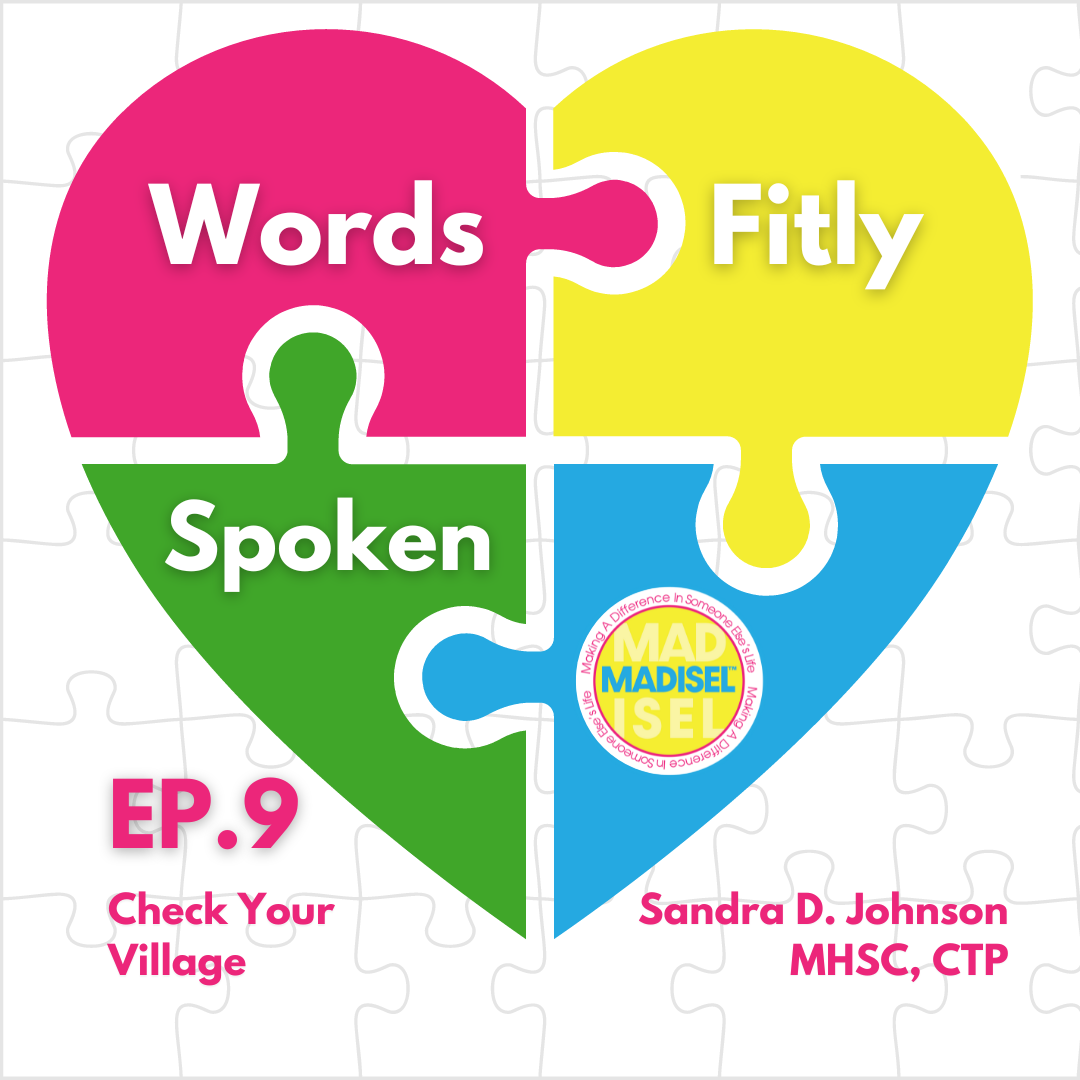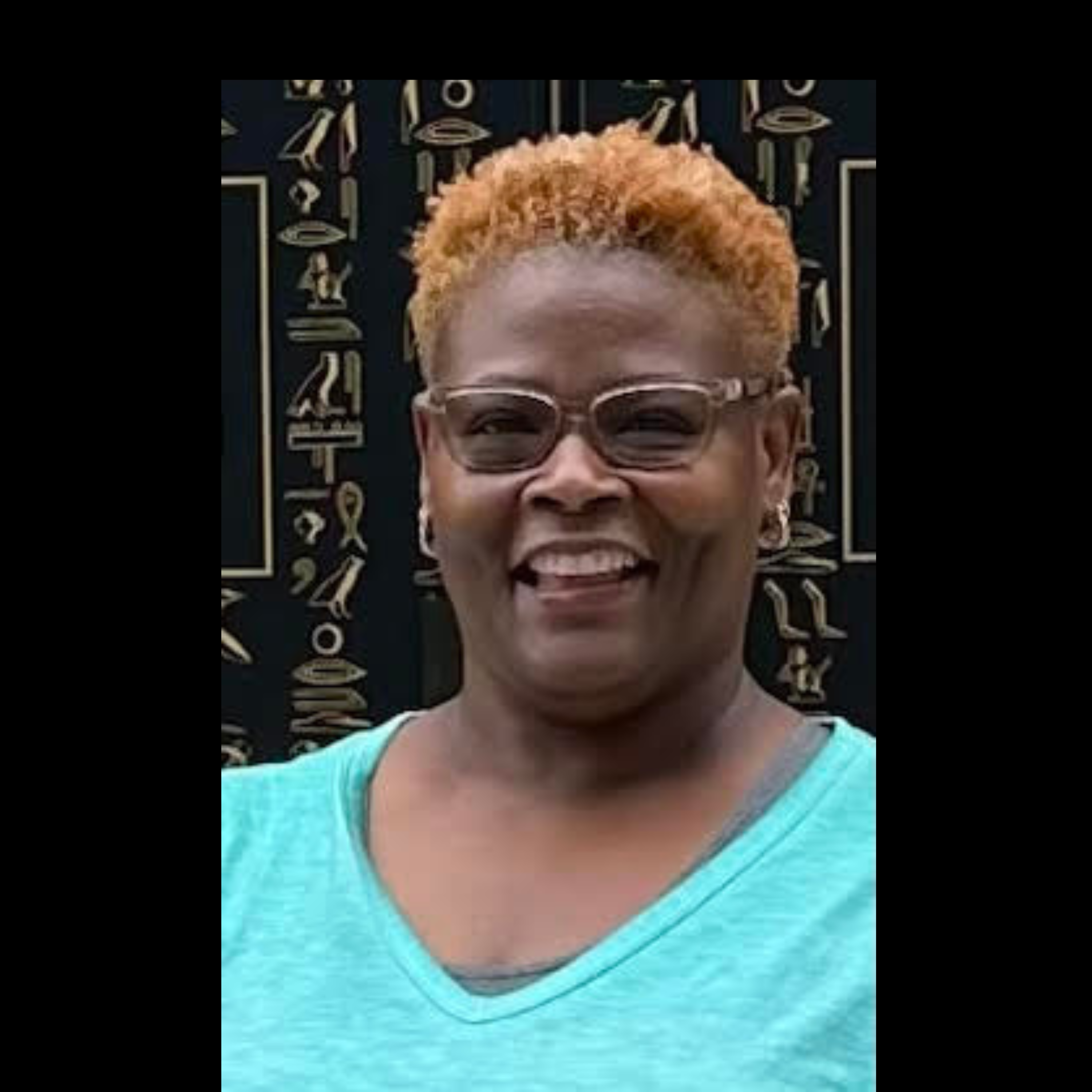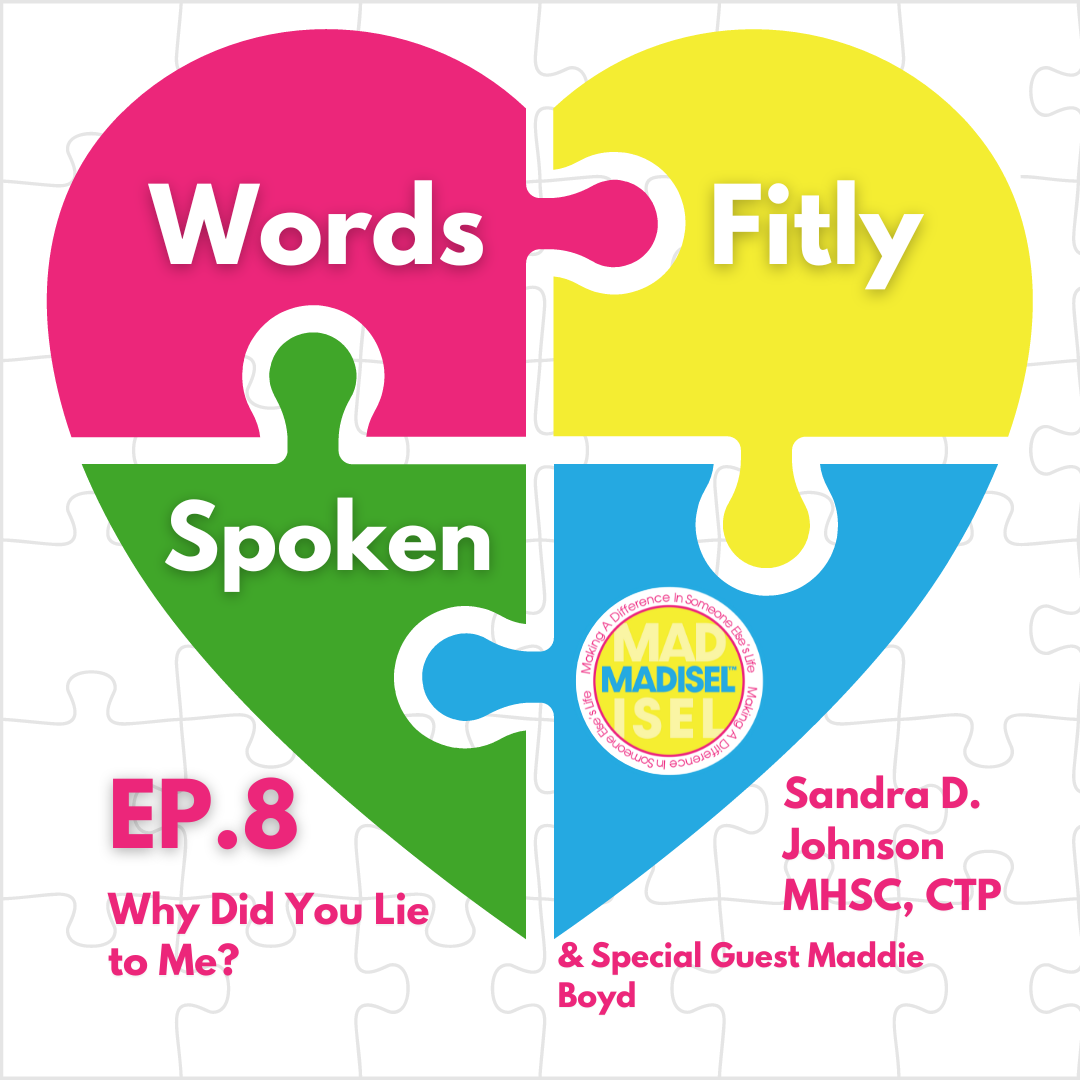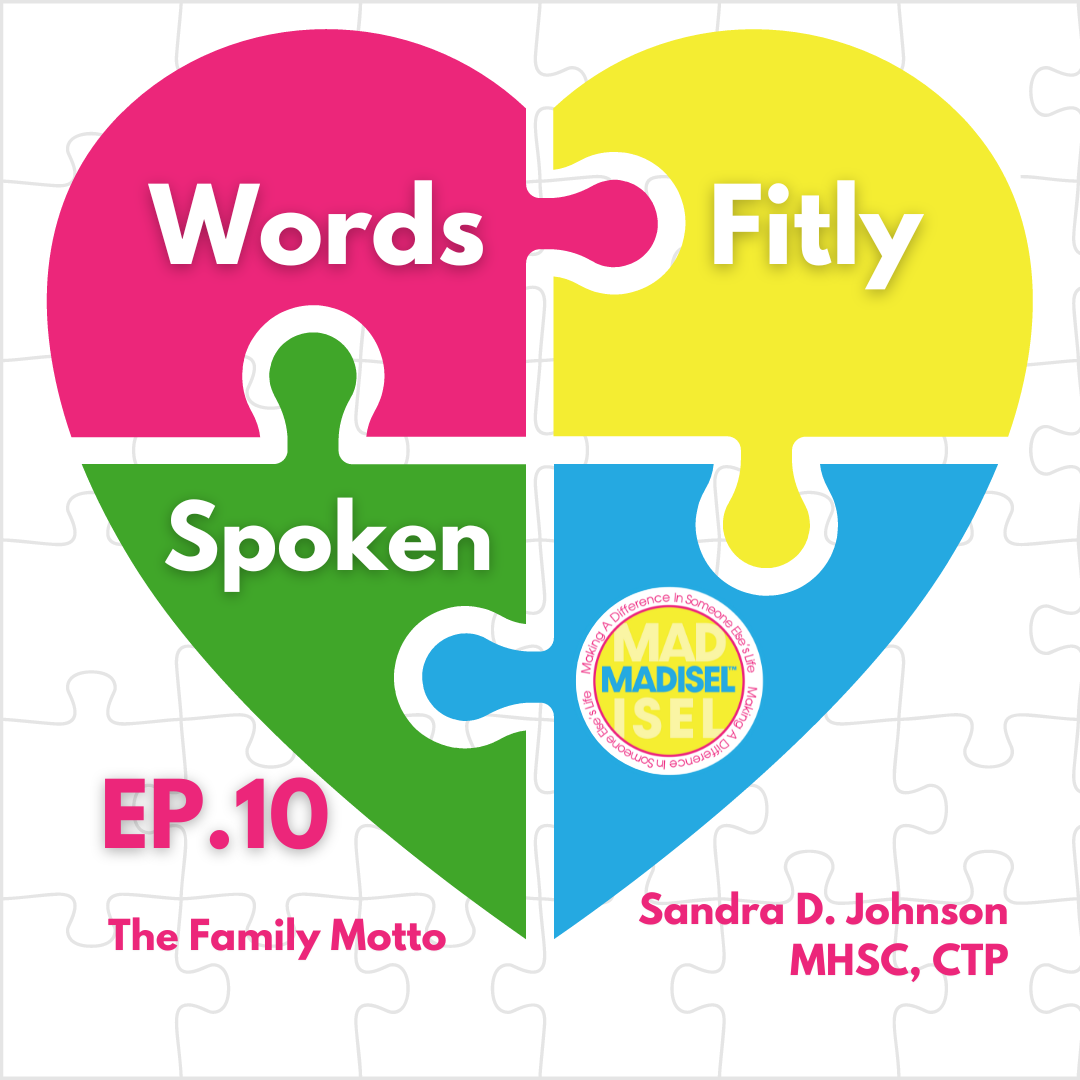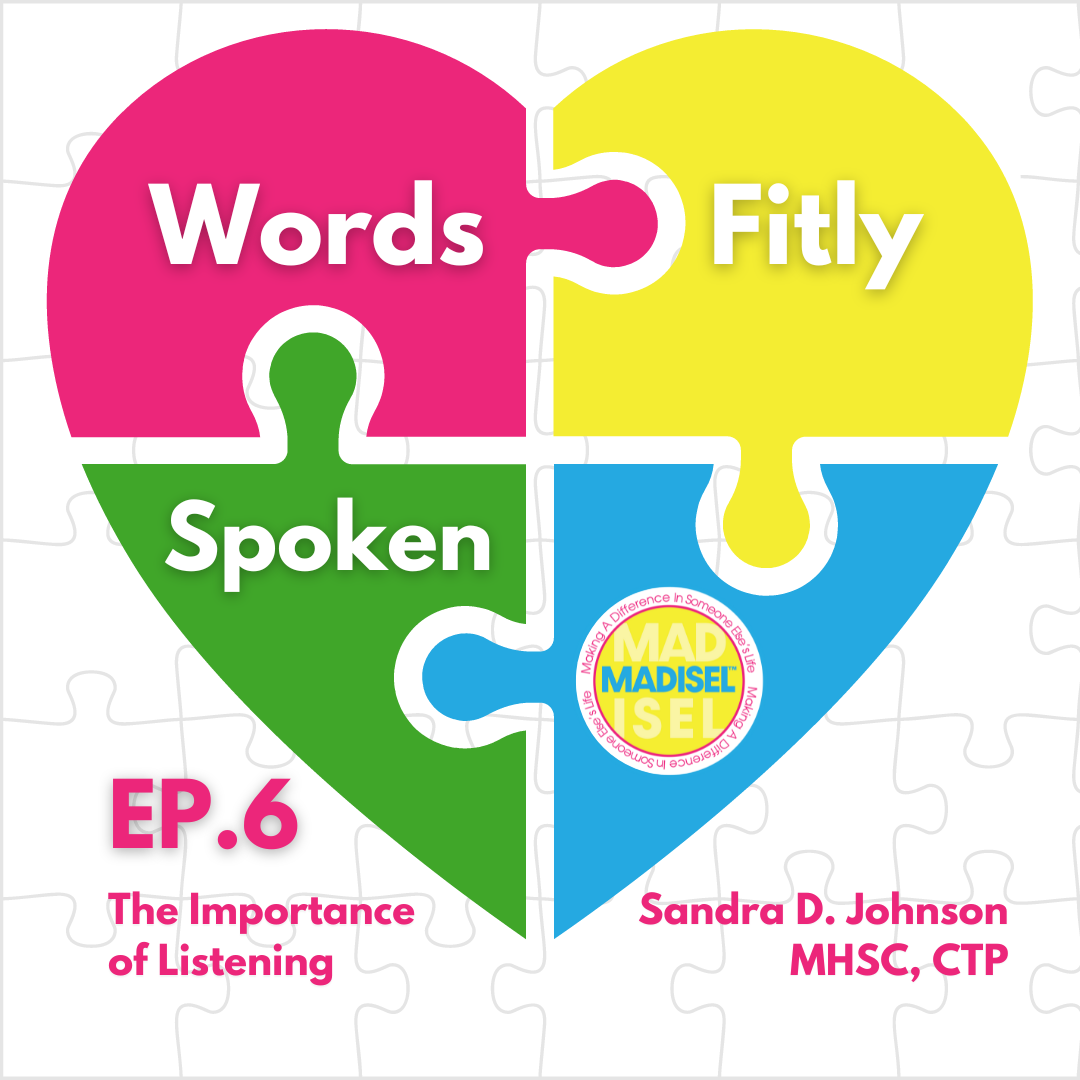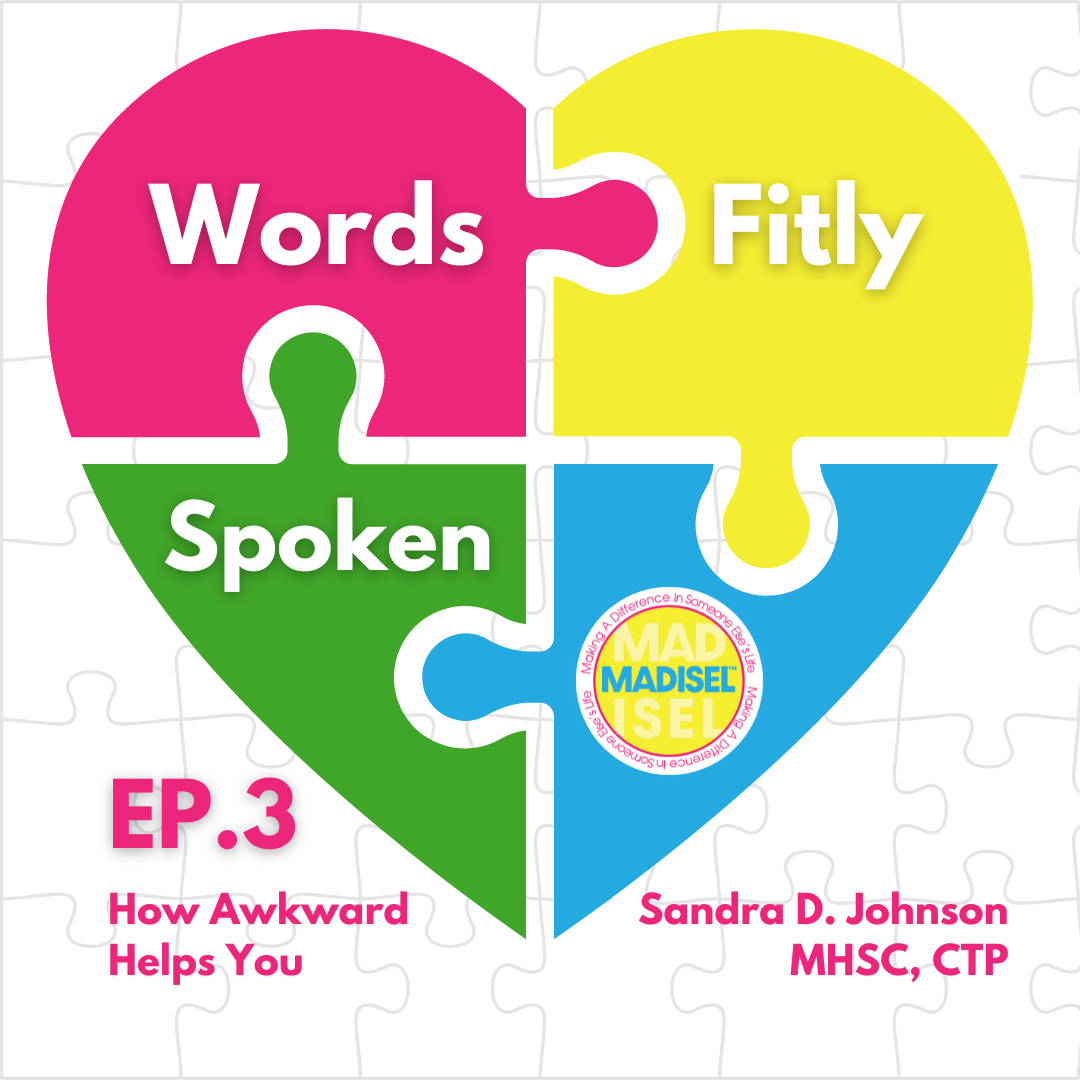In this podcast we discuss some great questions about the famous quote: “It takes a village to raise a child.” We will challenge the status quo and numbness of this quote by taking a look from a different angle. To support a new generation, we must evaluate our village dwellers.
View Full Transcript
Episode Transcript
Welcome to at MADISEL Coach and MADISEL TV's Words Fitly Spoken podcast. Hello there. I'm Coach Sandra, and I'm the host of Words Fitly Spoken podcast. Words Fitly spoken are words spoken at the right time for your encouragement and enrichment. On this podcast, we will deal with emotional and mental wellness by talking about the conflicts we have in our everyday relationships, whether at home, work, school, and the community.
Stop in to hear some helpful words that create awareness about your emotional health. Hey everybody. Welcome back to the podcast Words Fitly Spoken here at MADISEL Coach. Good to see everybody again. Thanks for joining me today. We're gonna talk about the village people, right?
What am what do I mean by the village people? It's, uh, this phrase, right, that we've heard, we've used, usually when it comes to dealing with children or family relationships, we say it takes a village to raise a child. So my question is, why do we believe it takes a village to raise a child? And another question that has come up is why is it important, uh, to have a village?
And yet even more questions are now being posed. Do you know who your village is? Okay, so why do we believe it takes a village? What are we talking about? So we're usually talking about supportive people around. It takes, um, more than just moms or dads. Uh, it can, it can involve aunts, uncles, grandparents, could be neighbors who are involved or close by, that care about what's going on with you and your children.
And when we think about this village, It's important to know, um, who makes up your village? People, right? Who are they? What do they believe? What are they really about? See if you have a village person with a hidden agenda that's dangerous for your family. So let's, let's jump into this a little bit deeper.
So I think what's important about the statement is, So I think we look at it sometimes the wrong way. We say it takes a village to raise a child, and I just believe we need to adjust that narrative to really say it takes the right village to raise a child. In other words, it takes the right people in that village to bring healthy support, healthy encouragement to you and your family.
And that could be through, um, Your city officials. It can be schools, it can be um, ex, you know, the extended family members. It could be neighbors, it could be church. All of these different people who are involved. I. It's important that they are the right village people. Now, it would be wonderful if you maybe could do a application process for we are looking for proper village people to help with this new family that is growing and developing because people need to be vetted.
Everybody that comes into the life of your children and your family, not all of those people are the right people or safe people. So I think we do need to be very cautious and pay attention, but we also need to be open to actually let the village people speak into your life. So don't just say it takes a village and not be willing to vet them, evaluate them.
But you also need to be willing to listen. So because we have such a distorted, um, view of sometimes the village and we let the phrase go unchecked, many parents have become, I think, dependent on the idea of a village. I've seen it from that side as well, where, um, they believe it's someone else's responsibility.
For the emotional wellbeing of their children and the family. Now
again, not everyone should be welcoming your village, so pay attention to what is going on with the village. I don't think it's the village people's responsibility to raise the family. I think we're a village person, however they're titled. They're there for support, they're there for encouragement.
They're there to help encourage the, the parents and the, the young people. It's important that we also understand a part of that village, not just the parents. It's not just the other adults, it is also the children. So in other words, everyone's voice is important. Are we listening to the children in the village?
Are we. Seeing and hearing their story and their lives as valuable. They're not just people that we have to pour into. They're actual important humans who they don't just take, but they also give, have we made space for them in the village, that we're not just here telling the children what they have to do, telling them what is good for them, what is bad for them.
But are we actually listening to how they process the world that they're growing up in? It's important that we join them in this 'cause we're not just joining their parents, we're also joining the young person. Um, that child, that teenager, that young adult in some families. We're joining the whole package and remembering that the young people are a part of that package.
Again, it takes the right village people. If, if you've not, um, come to speak life into that family and truth, into that family, um, you really need to hit the bricks. You shouldn't be there. You really shouldn't be welcome. And so I think we have to make sure we're putting up the right type of boundaries.
When we think about, we talk about this village, the village person, I, again, I think it's just so important that you cannot allow everyone to be speaking into your village. You can't let everybody, no one, everyone, el everyone shouldn't be welcome in your home because your home should be. A sacred place.
It's a special place. It is a safe place. Many children that I am meeting or connecting with in the community, uh, they're not finding their homes to be safe places. I'm wondering, is it because so many village people have been allowed to come in and out, make so many different comments and, uh, complaints sometimes, or, um, they influence how you are involved with your young person and they've messed up your special safe space.
They've messed up the space for your children. Now, how do you know if it's jacked up? You gotta pay attention. Parents, you've got to pay attention to your kids. You've gotta let, you've gotta listen to how they're saying, um, what's going on with that relative, you know, I can't even, I can't, um, not speak on this particular issue right here since we're talking about the village.
How many of our children. Have been, uh, abused because we let someone in the village that we should not have let in the village. That's an important piece that we have to consider, that we have welcomed trauma sometimes into the home because we trusted a person to join our village. That person wasn't healthy.
That person wasn't emotionally or mentally well, and now they're in your family and your innocent children are exposed to things they ought not have been exposed to or shouldn't be exposed to right now. We know now it's through cell phones, it's through video games, it's on the computers, all kinds of things, whether it be pornography or any other types of things that can help distract children and steal the beauty of their innocence.
I. So please double check your village. It takes a village to raise a child. No, it takes the right village to raise a child and to all of those potential village people. Um, I want to say this to you. We. I'm a village person myself, so I'm saying the message to myself as well. Um, I cannot call myself an expert on someone else's village.
I'm not here to be the expert. You are not here to be the expert. Um, we're neighbors. I'm here to encourage I'm, I'm here to show honor and respect for that family. Um, if they need something, I can, I can be a neighbor who can help provide that. Um, I need to show kindness. So to my village, people, please show kindness.
Be encouraging. Show, show that you care, show that, uh, you're willing. This is a tough one to yield the right of way. To the parents, to the children and whoever that supportive family is. So don't go into this village and make yourself an expert on someone else's family. We go into the family actually to serve.
So a right village person. If we are really serious about vetting them, they're gonna be someone who's a servant. They're not coming with their own agenda. And wanting to usurp authority from the people who have the authority in the family. So check your village, evaluate, vet. Don't just get caught up in a phrase.
It takes a village to raise a child. No, it takes the right village to raise a child. Thank you for joining me on this podcast. I am looking forward to talking to you more about these topics and anything that has to do with family, emotional and mental wellness. Bye-bye for now.
